初中英语状语从句归纳
初中英语状语从句整理必背-多个例句强化规律
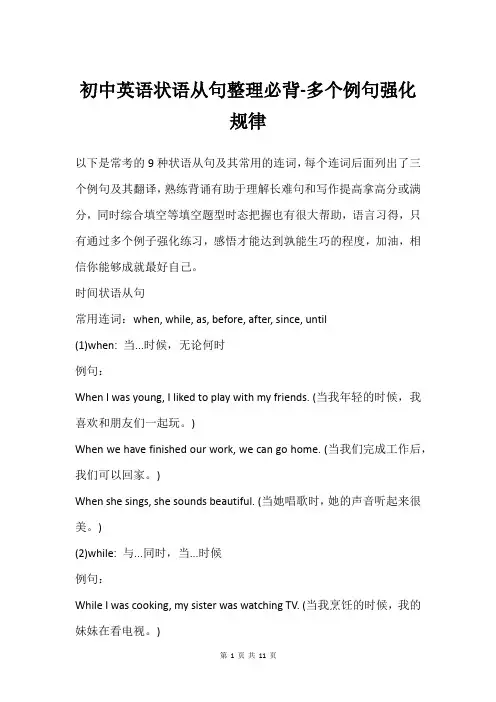
初中英语状语从句整理必背-多个例句强化规律以下是常考的9种状语从句及其常用的连词,每个连词后面列出了三个例句及其翻译,熟练背诵有助于理解长难句和写作提高拿高分或满分,同时综合填空等填空题型时态把握也有很大帮助,语言习得,只有通过多个例子强化练习,感悟才能达到孰能生巧的程度,加油,相信你能够成就最好自己。
时间状语从句常用连词:when, while, as, before, after, since, until(1)when: 当...时候,无论何时例句:When I was young, I liked to play with my friends. (当我年轻的时候,我喜欢和朋友们一起玩。
)When we have finished our work, we can go home. (当我们完成工作后,我们可以回家。
)When she sings, she sounds beautiful. (当她唱歌时,她的声音听起来很美。
)(2)while: 与...同时,当...时候例句:While I was cooking, my sister was watching TV. (当我烹饪的时候,我的妹妹在看电视。
)While we were waiting for the bus, we saw a dog on the street. (当我们等公交车的时候,我们在街上看到了一只狗。
)While she was writing her exam, she suddenly remembered something important. (当她在写考试的时候,她突然想起了重要的事情。
) (3)as: 当...时候,一边...一边...例句:As I was walking to school, I saw a cat chasing a bird. (当我步行去学校的时候,我看到了一只猫在追一只鸟。
初中英语状语从句知识点总结
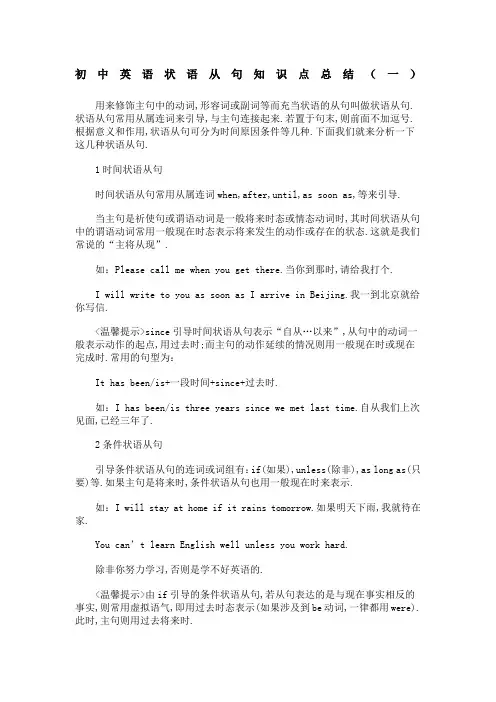
初中英语状语从句知识点总结(一)用来修饰主句中的动词,形容词或副词等而充当状语的从句叫做状语从句.状语从句常用从属连词来引导,与主句连接起来.若置于句末,则前面不加逗号.根据意义和作用,状语从句可分为时间原因条件等几种.下面我们就来分析一下这几种状语从句.1时间状语从句时间状语从句常用从属连词when,after,until,as soon as,等来引导.当主句是祈使句或谓语动词是一般将来时态或情态动词时,其时间状语从句中的谓语动词常用一般现在时态表示将来发生的动作或存在的状态.这就是我们常说的“主将从现”.如:Please call me when you get there.当你到那时,请给我打个.I will write to you as soon as I arrive in Beijing.我一到北京就给你写信.<温馨提示>since引导时间状语从句表示“自从…以来”,从句中的动词一般表示动作的起点,用过去时;而主句的动作延续的情况则用一般现在时或现在完成时.常用的句型为:It has been/is+一段时间+since+过去时.如:I has been/is three years since we met last time.自从我们上次见面,已经三年了.2条件状语从句引导条件状语从句的连词或词组有:if(如果),unless(除非),as long as(只要)等.如果主句是将来时,条件状语从句也用一般现在时来表示.如:I will stay at home if it rains tomorrow.如果明天下雨,我就待在家.You can’t learn English well unless you work hard.除非你努力学习,否则是学不好英语的.<温馨提示>由if引导的条件状语从句,若从句表达的是与现在事实相反的事实,则常用虚拟语气,即用过去时态表示(如果涉及到be动词,一律都用were).此时,主句则用过去将来时.如:If I had enough money,I would buy it for you.如果我又足够的钱,我将把它买给你.I w ouldn’t do it if I were you.如果我是你,我是不会做的.3原因状语从句because,since,as,for都可用来引导原因状语从句,那么它们又有哪些区别呢①because用来表示“造成某种结果的直接原因”,语气较浓,常用来回答why提出的问句.如:---Why are you late---Because my bike is broken.②as和since用来表示“看的到的或是不说也知道的原因”,since也可译作:“既然”.如:As he is old enough,let him do it.他既然长大了,就让他干吧Since his shoes are worn out,let’s buy him a new pair.既然他的鞋坏了,那我们就给他买双新的吧.③for引导的原因状语从句不置于句首,常用来表示“顺便提及的理由”,只是稍带说明原因,并非强调.如:I must stay here,for it’s raining so hard.我必须得待在这儿,因为雨下的很大.初中英语状语从句知识点总结(二)1状语从句在复合句中,修饰主句中的动词、形容词或副词等的从句叫状语从句.状语从句根据它表达的意思可分为时间、地点、原因、目的、结果、让步、比较(或方式)和条件等类.1.时间状语从句引导连词有when,while,till,not…until,since,after ,before ,as soon asThe bus won’t start until everybody gets on.公共汽车直到每人都上车为止,才开动.When he knocked at the door I was cooking.当他敲门时,我正在煮饭.Last night before he came back home, his wife had already cooked dinner and waited for 2 hours.昨天晚上在他回到家之前,他的妻子已经做好晚饭足足等了他两小时之久.After I went to church, I went shopping.2. 地点状语从句地点状语从句通常由where, wherever 引导.Where there is a will, there is a way. 哪里有志向,哪里就有出路.有志者事竟成.Where there is a life, there is a hope. 哪里有生命,哪里就有希望.留得青山在,不怕没柴烧.Wherever you go, whatever you do, I will be right here waiting for you.不管你去哪里,不管你做什么,我都会在此守侯你.3.原因状语从句引导连词有because,as, since.He didn′t see the film because he had seen it.他没有看那部电影,因为他已经看过了.They couldn’t get on the train,for it was too crowed.比较:because, since, as和for1)because语势最强,用来说明人所不知的原因,回答why提出的问题.当原因是显而易见的或已为人们所知,就用as或 since.I didn't go, because I was afraid.Since /As the weather is so bad, we have to delay our journey.2)由because引导的从句如果放在句末,且前面有逗号,则可以用for来代替.但如果不是说明直接原因,而是多种情况加以推断,就只能用for.He is absent today, because / for he is ill.He must be ill, for he is absent today.注意because不能和so 连用.4. 目的状语从句引导连词有that, so that…,in order that.He must get up early so that he can catch the first bus.他必须早起,以便能赶上第一辆公共汽车.He repainted the house so that he could welcome the guests.Millions of trees are planted in North China so that the sand can be stopped from moving south.The mother left work earlier in order that she could be at home when the children arrived.So that …——以便/以致……例如:(1)They studied hard so that they could pass the exam.(2)They started early so that they caught the early bus.注意点:在例句(1)中,是引导目的状语;在例句(2)中,是引导结果状语.一般来讲,从句中含有情态动词的,为目的状语.无情态动词的,为结果状语.5.结果状语从句引导连词有that,so…that…,such….thatThe box is so heavy that I can’t lift it.这个盒子如此沉,以致我无法抬起来.such+名词性词组+that…So+形容词/副词+that…——如此……以致……例如:(1)She is such a good teacher that we all love her.(2)It was such a hot day that they didn’t go out for a walk as usual.注意点:+a+形容词+名词+that…,可以改写成:so+形容词+a+名词+that…,例句(1)可以改写成:She is so good a teacher that we all love her.2.在such+形容词+名词复数或不可数名词+that…结构中,形容词如果是many/few或much/little时,用so不用such,即:so+many/few+可数名词复数+that…,so+much/little+不可数名词+that…(1)There are so many people in the room that I can’t get in.(2)The man has so much money that he can buy a car.6.让步状语从句引导连词有though,although; even though/if; whatever; howeverAlthough he is young,he knows a lot of things.虽然他年龄小,但却认识许多事物.Even though you don’t like him, you still have to be polite.Whatever you say, I will not change my mind.注意although,though不能和but连用.7.比较(方式)状语从句以than为引导连词.常见连词(as)…as.., …than…; the…, the…Jim is older than Lucy(is).吉姆比路希年长.Skiing is more exciting than running.The more you practice, the more knowledge you will get.注意than 引导的比较状语从句中的谓语常省略.8.条件状语从句以if, unless为引导连词.If you eat bad food,you may be ill.如果你吃到坏了的食物,就会生病.If it doesn’t rain tomorrow, we will have a sports meet.注意主句是将来时,从句用一般现在时.状语从句中常见的误点1)时间状语从句和条件状语从句中的时态与主句的搭配:(俗称:主将从现)2)原因状语从句because与because of ;Because+从句和because of +n./ pron例如:I was late because I didn’t catch the bus.I was late because of the rain.。
初中英语状语从句知识点总结归纳
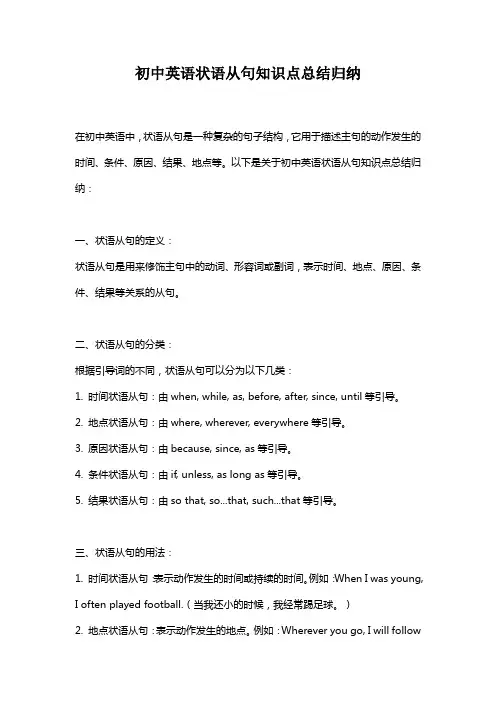
初中英语状语从句知识点总结归纳在初中英语中,状语从句是一种复杂的句子结构,它用于描述主句的动作发生的时间、条件、原因、结果、地点等。
以下是关于初中英语状语从句知识点总结归纳:一、状语从句的定义:状语从句是用来修饰主句中的动词、形容词或副词,表示时间、地点、原因、条件、结果等关系的从句。
二、状语从句的分类:根据引导词的不同,状语从句可以分为以下几类:1. 时间状语从句:由when, while, as, before, after, since, until等引导。
2. 地点状语从句:由where, wherever, everywhere等引导。
3. 原因状语从句:由because, since, as等引导。
4. 条件状语从句:由if, unless, as long as等引导。
5. 结果状语从句:由so that, so...that, such...that等引导。
三、状语从句的用法:1. 时间状语从句:表示动作发生的时间或持续的时间。
例如:When I was young,I often played football.(当我还小的时候,我经常踢足球。
)2. 地点状语从句:表示动作发生的地点。
例如:Wherever you go, I will followyou.(无论你去哪里,我都会跟着你。
)3. 原因状语从句:表示动作发生的原因。
例如:As it was raining, we had to stay indoors.(因为下雨了,我们不得不呆在室内。
)4. 条件状语从句:表示动作发生的条件。
例如:If it snows tomorrow, we will not go out.(如果明天下雪,我们就不出去了。
)5. 结果状语从句:表示动作发生的结果。
例如:She worked hard so that she could pass the exam.(她努力学习以便能通过考试。
初中英语:状语从句所有知识点归纳
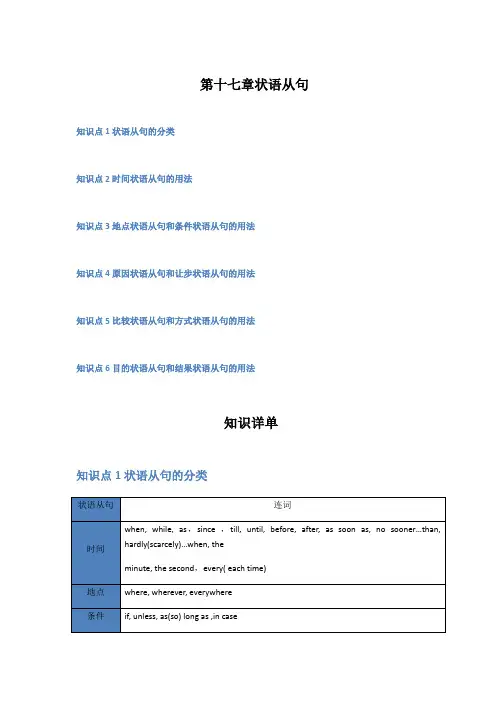
第十七章状语从句知识点1状语从句的分类知识点2时间状语从句的用法知识点3地点状语从句和条件状语从句的用法知识点4原因状语从句和让步状语从句的用法知识点5比较状语从句和方式状语从句的用法知识点6目的状语从句和结果状语从句的用法知识详单知识点1状语从句的分类知识点2时间状语从句的用法知识点3地点状语从句和条件状语从句的用法知识点4原因状语从句和让步状语从句的用法知识点5比较状语从句和方式状语从句的用法知识点6目的状语从句和结果状语从句的用法考点突破考点1考查时间状语从句的用法1.(龙东中考)-Henry, please call us as soon as you _______ Hawaii.-OK. I'll do that, Mom.A. arrive inB. are arriving inC. will arrive at【解析】选择A as soon as结构意为“一……就……,”引导时间状讲从句,主句为祈使句,从句用一般现在时表示将来。
Hawaii 为大地点.因此用in.考点2考查地点状语从句的用法2.(扬州中考)-My friend has achieved his goal after years of hard work.--- Great.A·One tree can make a forest B. Where there is a will,there is a way C. Many hands make light work D. A friend in need is a friend indeed【解析】选B 第一个人阐述自己的朋友经过多年努力实现目标.,第二个人表示祝贺,同时,发表自己对此事的看法。
应该是“有志者,事竟成”.该句是where引导的地点状语从句。
考点3考查条件状语从句的用法3.(十堰中考)_________ deal with our problems, we can easily become unhappy.A. UntilB. IfC. UnlessD. Though【解析】选C。
初中英语知识点归纳状语从句的分类和用法
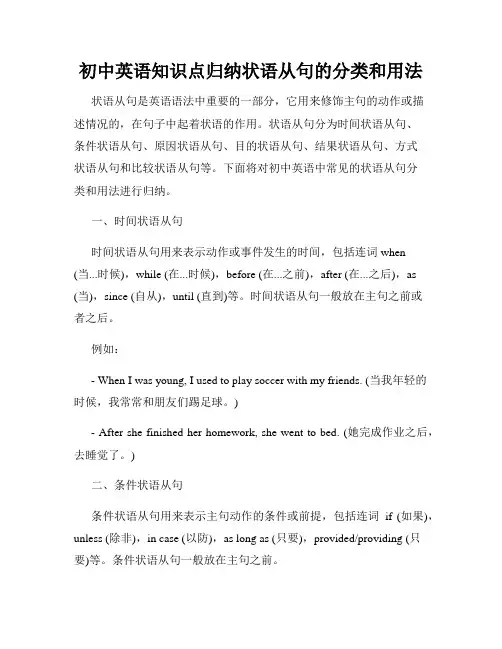
初中英语知识点归纳状语从句的分类和用法状语从句是英语语法中重要的一部分,它用来修饰主句的动作或描述情况的,在句子中起着状语的作用。
状语从句分为时间状语从句、条件状语从句、原因状语从句、目的状语从句、结果状语从句、方式状语从句和比较状语从句等。
下面将对初中英语中常见的状语从句分类和用法进行归纳。
一、时间状语从句时间状语从句用来表示动作或事件发生的时间,包括连词when (当...时候),while (在...时候),before (在...之前),after (在...之后),as (当),since (自从),until (直到)等。
时间状语从句一般放在主句之前或者之后。
例如:- When I was young, I used to play soccer with my friends. (当我年轻的时候,我常常和朋友们踢足球。
)- After she finished her homework, she went to bed. (她完成作业之后,去睡觉了。
)二、条件状语从句条件状语从句用来表示主句动作的条件或前提,包括连词if (如果),unless (除非),in case (以防),as long as (只要),provided/providing (只要)等。
条件状语从句一般放在主句之前。
例如:- If it rains tomorrow, we will stay at home. (如果明天下雨,我们就在家呆着。
)- Unless you work hard, you won't pass the exam. (除非你努力学习,否则你就不能通过考试。
)三、原因状语从句原因状语从句用来表示主句动作或情况的原因,包括连词because (因为),as (因为),since (因为),for (因为),now that (既然)等。
原因状语从句一般放在主句之前。
例如:- Because it was raining, we stayed at home. (因为下雨,我们呆在家里。
初中英语状语从句知识点总结
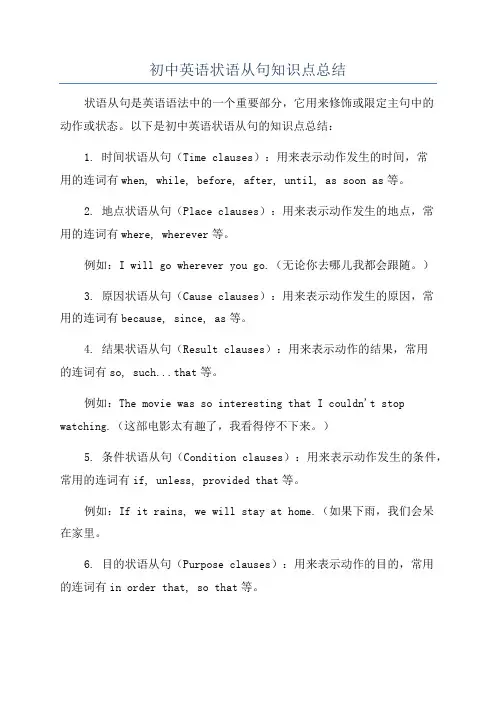
初中英语状语从句知识点总结状语从句是英语语法中的一个重要部分,它用来修饰或限定主句中的动作或状态。
以下是初中英语状语从句的知识点总结:1. 时间状语从句(Time clauses):用来表示动作发生的时间,常用的连词有when, while, before, after, until, as soon as等。
2. 地点状语从句(Place clauses):用来表示动作发生的地点,常用的连词有where, wherever等。
例如:I will go wherever you go.(无论你去哪儿我都会跟随。
)3. 原因状语从句(Cause clauses):用来表示动作发生的原因,常用的连词有because, since, as等。
4. 结果状语从句(Result clauses):用来表示动作的结果,常用的连词有so, such...that等。
例如:The movie was so interesting that I couldn't stop watching.(这部电影太有趣了,我看得停不下来。
)5. 条件状语从句(Condition clauses):用来表示动作发生的条件,常用的连词有if, unless, provided that等。
例如:If it rains, we will stay at home.(如果下雨,我们会呆在家里。
6. 目的状语从句(Purpose clauses):用来表示动作的目的,常用的连词有in order that, so that等。
例如:I bought a new notebook so that I can take notes in class.(我买了一个新笔记本,这样我可以在课堂上记笔记。
)7. 方式状语从句(Manner clauses):用来表示动作发生的方式,常用的连词有as, as if, as though等。
例如:He speaks as if he knows everything.(他说话的样子就像他什么都知道。
初中英语知识点归纳条件状语从句的引导词和用法
初中英语知识点归纳条件状语从句的引导词和用法条件状语从句是英语语法中的一种特殊句型,用来表示某个条件成立时会发生的情况。
在条件状语从句中,引导词起到引导从句的作用。
本文将对初中英语知识点中的条件状语从句的引导词和用法进行归纳。
一、if引导的条件状语从句1. 当主句是一般现在时时,条件状语从句可以是一般现在时或should + 动词原形。
例如:- If he comes early, we will go to the movies together.- If it rains tomorrow, we should stay at home.2. 当主句是一般过去时时,条件状语从句要用过去时态。
例如:- If I had money, I would buy a new car.- If he studied hard, he could pass the exam.3. 当主句是一般将来时时,条件状语从句可以使用一般现在时或一般过去时。
例如:- If you go shopping, I will wait for you here.- If I had time, I would help you with your homework.二、unless引导的条件状语从句1. Unless 在句中的含义与if相反,表示“除非”,引导的条件状语从句与if引导的条件状语从句的用法相同。
例如:- I won't go to the party unless you invite me.- Unless you practice more, you won't improve your English.三、as long as引导的条件状语从句1. As long as 表示“只要”,引导的条件状语从句要使用一般现在时。
例如:- You can join us as long as you finish your homework.- As long as you work hard, you will succeed.四、in case引导的条件状语从句1. In case 表示“以防”,引导的条件状语从句使用一般现在时。
初中英语知识点归纳时间状语从句的引导词和结构
初中英语知识点归纳时间状语从句的引导词和结构时间状语从句是英语中一种常见的句子结构,用来表示时间上的关系。
正确使用时间状语从句可以让句子更加准确和流畅,提高语言表达的准确性。
本文将对初中英语中常见的时间状语从句的引导词和结构进行归纳总结。
一、前置时间状语从句1. 引导词:when(当...时候)、while(当...的时候)、as(当...时候)、before(在...之前)、after(在...之后)例句:- When I was a child, I used to play with my friends in the park.- While he was cooking dinner, the phone rang.- As I was leaving the house, I remembered to take my umbrella.- Before I went to bed, I finished my homework.- After she finished her work, she went shopping.2. 引导词:once(一旦)、as soon as(一...就)、the moment(一...就)、the minute(一...就)例句:- Once you start reading this book, you won't be able to put it down.- As soon as the bell rang, the students rushed out of the classroom.- The moment she saw him, her face lit up with joy.- The minute I arrived at the station, the train left.二、后置时间状语从句1. 引导词:when(当...时候)、while(当...的时候)、before(在...之前)、after(在...之后)、until/till(直到...的时候)、since(自...以来)例句:- I will call you when I arrive at the airport.- She likes to listen to music while she's doing homework.- I went to bed before it started raining.- After she finished her meal, she paid the bill and left.- He didn't speak up until/till the end of the meeting.- Since you have been away, many things have changed.2. 引导词:once(一旦)例句:- You will succeed once you put enough effort into it.三、并列时间状语从句1. 引导词:when(当...时候)、whenever(无论何时)、while (当...的时候)、as(当...时)例句:- You can come to my house when you have time.- Whenever I see a dog, I can't help but smile.- While I was reading a book, my brother was watching TV.- As she was walking in the park, she saw a beautiful flower.2. 引导词:before(在...之前)、after(在...之后)例句:- I will finish my homework before I go out to play.- After she finished her lunch, she went for a walk.以上是初中英语中常见的时间状语从句的引导词和结构的归纳总结。
初中英语知识点归纳状语从句的用法
初中英语知识点归纳状语从句的用法状语从句是英语语法中常见的一种句子结构,用来修饰动词、形容词、副词等。
归纳总结了初中英语中常见的状语从句的用法,可以帮助初学者更好地理解和运用这一知识点。
一、时间状语从句1. 当状语从句表示将来的动作或情况时,主句使用一般将来时态,从句使用一般现在时态。
例如:I will go to bed after I finish my homework.(在我完成作业之后,我会去睡觉。
)2. 当状语从句表示过去的动作或情况时,主句使用过去时态,从句使用过去完成时态。
例如:He had left before I arrived.(在我到达之前,他已经离开了。
)3. 当状语从句表示现在的动作或情况时,主句使用一般现在时态,从句使用一般现在时态。
例如:I always eat breakfast before I go to school.(在我去学校之前,我总是吃早饭。
)二、地点状语从句1. 当状语从句表示具体位置时,主句使用动词arrive等,从句使用介词+地点名词的结构。
例如:We will meet at the place where we had lunch yesterday.(我们将在我们昨天吃午饭的地方见面。
)2. 当状语从句表示方向时,主句使用动词come/go等,从句使用连词where或标点符号将其与主句分开。
例如:He will go wherever you go.(无论你去哪儿,他都会去。
)三、原因状语从句1. 当状语从句表示结果时,主句使用so,主句中动词通常使用情态动词。
例如:I am ill, so I can't go to school.(我生病了,所以不能去学校。
)2. 当状语从句表示原因时,主句使用because,从句使用一般现在时态。
例如:He didn't eat breakfast because he got up late.(他早上起得晚,所以没有吃早饭。
初中英语中考常考状语从句整理汇总(共9类)
中考英语常考状语从句1.时间状语从句When/while/as, since, as soon as, until/till, before, after,once, by the time, the minute/ the moment(一...就...), every/each time, whenever,...(1) When & while &as①When:表示“当...时”,后面跟时间点、时间段均可,因而从句的动词可以是非延续性动词(又叫短暂性动词)或延续性动词。
例如:He was watching TV when his mom came back.当他妈妈回来时,他正在看电视。
When his mom was cooking, he was watching TV.当他妈妈做饭的时候,他正在看电视。
②While:表示“当..时”,后面只能跟时间段,因而从句的动词也只能是延续性动词,且常为进行时态(现在进行时或过去进行时)。
例如:While his mom was cooking, he was watching TV.当他妈妈做饭的时候,他正在看电视。
③as:表示“一边...一边...”【注意】与while区分:当一个人同时进行两个动作时(即主从句的主语是同一个人时),只能用as。
还可表示“随着...”。
例如:Tom sings as he works. Tom一边唱歌一边工作。
As time went by, I learned how to be strong.随着时间的流逝,我学会了如何变得坚强。
(2) until & till (介词/连词)until:表示“直到...”,表示某个动作或状态一直持续到...为止。
例如:They waited until/till their mom came back.他们一直等到妈妈回来。
(主句谓语动词为延续性动词)“not...until”表示“直到...才”。
- 1、下载文档前请自行甄别文档内容的完整性,平台不提供额外的编辑、内容补充、找答案等附加服务。
- 2、"仅部分预览"的文档,不可在线预览部分如存在完整性等问题,可反馈申请退款(可完整预览的文档不适用该条件!)。
- 3、如文档侵犯您的权益,请联系客服反馈,我们会尽快为您处理(人工客服工作时间:9:00-18:30)。
状语从句指句子用作状语时,起副词作用的句子。
它可以修饰谓语、非谓语动词、定语、状语或整个句子。
根据其作用可分为时间、地点、原因、条件、目的、结果、让步、方式和比较等从句。
状语从句一般由连词(从属连词)引导,也可以由词组引起。
从句位于句首或句中时通常用逗号与主句隔开,位于句尾时可以不用逗号隔开。
一、时间状语从句要点: 时间状语从句,由以下连词引导:when while as after before as soon as since till /until by the time 在时间状语从句中,要注意时态一致。
一般情况下主句是将来时的时候,从句要用一般现在时。
当。
的时候mozart started writing music when he was four years old.(当)莫扎特的时候,开始写音乐作品。
当。
时he visited a lot of places while he was traveling.他在旅途中参观了许多地方。
在。
的同时;一边。
一边。
he smiled as he stood up.他一边站起来一边笑着。
在。
之后he left the classroom after he had finished his homework the other day.前几天做完作业之后回的家。
在。
之前mr. brown had worked in a bank for a year before he came here.布朗先生来这之前已经在一家银行里工作一年了。
soon as 一。
就。
we began to work as soon as we got there.我们一到那就开始工作。
i will write to you as soon as i get home.我一到家就给你写信。
自。
以来到现在表示自过去的一个起点时间到目前(说话时间)为止的一段持续时间。
主句一般用现在完成时,从句用一般过去时。
mr green has taught in that school since he came to china three years ago.自格林先生来中国以来,他就在这所学校教书。
(还可以用作介词,本句从句还可以用短语:since three years ago(自三年前以来)表示。
)8 till /until都可以作连词,连接时间状语,也可以作介词,与其它词构成介词短语,在句中作状语。
they walked till /until it was dark.他们一直走到天黑。
xiao ming didn’t leave home till / until his father came back.小明直到他爸爸回来才离开家。
9. by the time 到。
为止(所在句子的主句应用完成时)by the time he gets there , his father has already gone.他到家的时候,他爸爸已经走了。
by the time i got to school, the class had already began.我到校时,已经开始上课了。
难点——as when while的辨析as when while都表示主、从句动作同时发生,三者差异如下:表示“一边。
一边"的意思as 强调两个动作同时进行,并表示对比时用于发生时间较段时when 1、还可以表示从句动词的动作在主几句动词的动作"之前"或"之后"发生。
2、when=and then; at that moment (正在那个时候)while 1、用于时间较长时2、强调两个动作同时进行,并表示对比时有时这三个连词可以互换,有时不可以。
lit was raining hard when (as) i got there.我到那里时,正在下大雨。
( 动作同时发生,when可换为as, 但不能换为while,因为get是点动词.)lwhen i had read the article, he called me.我看完这篇文章之后,她给我打了电话。
( 从句动作发生在主句之前,注意时态表达,只能用when )lwhen i got to the cinema, the film had begun.(当)我到了电影院时,电影已经开演了。
(从句的动作发生在主句之后,只能用when,并要注意时态)lhe was about to leave, when the telephone rang.他正要离开,忽然电话响了。
( 此时不能放在句首。
主句动词一般表达“正在” “即将”.while, as不能代替) 考点lshe thought i was talking about her daughter, while, in fact, i was talking about my daughter.他以为我在谈她女儿,然而,实际上在谈论我女儿。
(表转折,对比,when, as都不能代替它) 考点lwhile the alien was buying a souvenir, the girl called the police.外星人买纪念品时,那女孩给警察打了电话。
(表示主句,从句的动作同时发生,while后引导的状语从句的动词必须是延续动词不能是点动词,因为它表示较长时间)考点lmother was worried because little alice was ill, especially as (when/ while) father was away.妈妈担心,因为小爱丽丝病了,特别是他父亲不在家的时候。
(此时as ,when, while可通用)知识扩展1. it is since从。
以来多长时间了(因为since +从句或名词,表示一段时间)it is five years since we met last time.从我们上次见面已经五年了。
2. it is +before…(。
才)it was a long time before i went to sleep again.过了很长时间我才睡着。
it was an hour before(=until) the police arrived.过了一个小时,警察才来。
二、条件状语从句要点:表示状语从句由连词if, unless (=if not) 引导。
it doesn’t rain tomorrow, we will go hiking.如果明天不下雨, 我们就去远足.will get good grades if you study hard.如果你努力学习,就会取得好成绩.will go to the party unless he goes there too.我不会去参加聚会的, 除非他也去.(如果他不去,我也不去.)will be late unless you leave immediately.如果你不马上走,你将会迟到的.(=if you don’t leave immediately, you will be late.)难点提示:用条件状语从句时要注意时态的正确使用,当主句是将来时的时候,从句要用一般现在时.lhe will not leav e if it isn’t fine tomorrow.一般将来时,一般现在时lthey are going to have a picnic if it doesn’t rain next week.一般将来时, 一般现在时考点三、原因状语从句要点: 由连词because, since, as引导, 也可由for, now that 等词引导didn’t go to school yesterday because i was ill.我昨天没去上学,因为我生病了。
2. since everybody is here, let’s begin our meeting.既然大家都来了, 让我们开始开会吧.3. as you are in poor health, you should not stay up late.既然你身体不好, 你就不该熬夜.asked her to stay to tea, for i had something to tell her.我请她留下来喝茶,因为我有事要告诉她..难点——because , since , as , for,辨析在语气上,because 最重, 表示的是直接理由,回答why 时只能用它. 其次是since, as ,一般不表示原因, 而是表明理由, 进一步说明.(译为:由于,既然). for 被认为是复合句的并列连词(常用于推断),表示理由.四、地点状语从句要点: 由连词where和复合关系词wherever (=no matter where )引导.知识扩展there is a will , there is a way.有志者事竟成。
(谚语)will be mixed school where not all the children are disabled.他将是一所混合式学校,那里的儿童并不都是残疾。
(在限定性定语从句中对限先行词起限定作用。
)you go , i go too.无论你到什么地方,我都去。
(wherever=no matter where)无论何处,多用于句首。
there is smoke , there is fire.无风不起浪。
(谚语)4. while she was wondering where to go , she met a policeman.疑问副词where后跟不定式,构成不定式短语. 考点五、目的,结果状语从句要点:目的状语从句由连词that, so that, so…that , in order that 引导。
结果状语从句由连词( so )that, so…that, such…that, so much/many…that引导。
…that 如此…以至于the scientist’s repo rt was so instructive that we were all very excited.科学家的报告很有启发性,我们感到很兴奋。
he always studied so hard that he made great progress.他总是那么努力,结果他取得了很大的进步。
that 以至, 以便i’ll run slowly so that you can catch up with me. (目的)我将慢慢跑以至你能赶上我。
